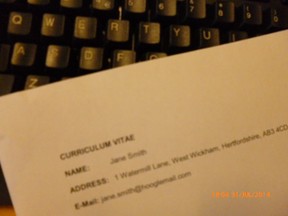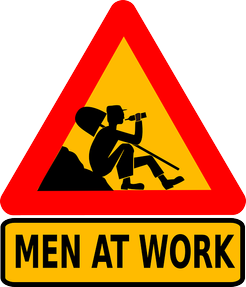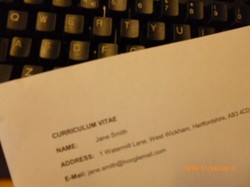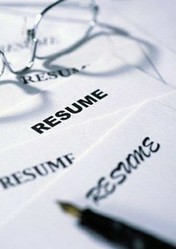Why do you need to write a CV? In many cases, it’s the first impression that an employer will get of you, your chance to make a good impression, to show a prospective employer that you have the necessary skills and attributes for their job vacancy. When I went for my first job “interview,” I was still at school, and went to see my prospective boss with my hockey stick in hand, in my school uniform. Amazingly, I got the job, without having had to put pen to paper, but nowadays, the job market is far more competitive and schoolgirl (or schoolboy) charm alone is unlikely to work. So write a CV.

How to Write a Curriculum Vitae (CV)
by Telesto
Writing a CV is one of the most important parts of the job seeking process. It's your first opportunity to sell yourself. First impressions last, so make it a good one.
What is a CV?
A CV, or Curriculum Vitae, is quite simply a summary of your educational and professional history. In other English speaking countries, they may be called résumé’s. Some employers don’t use CVs, they have bespoke application forms. If that’s what an employer wants, you’ll have to go wit h it, but a good CV is often your first step towards getting a job.
h it, but a good CV is often your first step towards getting a job.
Think of a CV (or an application form) as your first chance to market yourself, your skills and your abilities. If you are applying for several jobs in one career area, you can send the same CV to a number of prospective employers.
Remember when you are writing your CV, that whoever is reading it may be looking at a huge pile of them, and, because they need to do justice to all of them, it is a tiring job that requires concentration. Make their job easier by:
- Ensuring that you spell and grammar check the CV, and then proof read it properly.
- Lay it out clearly, judiciously using bullet points and bold text to clarify points.
- Present the information in a logical sequence.
What Should I include?
Personal details
Name, address, telephone number, e-mail address. In the UK, it is no longer necessary to include your date of birth, due to age discrimination legislation. A shrewd employer can make a guess at your age by your employment and education history, but you don’t want to run the risk of being sifted out because of your age, so leave it out.
In the UK, photographs aren’t generally submitted with CVs, unless requested. However, if you do submit a photograph, make it a passport sized one, and ensure that you look clean and smart in it.
NB If you include an e-mail address, use one like [email protected] rather than one like [email protected]. Remember, this is your first chance to make a good impression and you will never get another one!
A brief personal profile
This should only be a few lines long, but should highlight some of the key areas needed for the role for which you are applying. So for a job that involves working with people, you could say that you have experience of dealing with demanding customers, excellent negotiating and influencing skills and are good at dealing with conflict. Try to steer away from very general terms or those that most people tend to use, eg, “I’m hard working and dynamic.”
Employment History
Only put this next if you’ve been working for some time. Start with your most recent job and work backwards. If you’ve had several roles within the same organisation, list the most recent first. Try to relate the skills you include to the job for which you are applying, for example, if you are applying for a job as a life guard; highlight your swimming and lifesaving abilities rather than your excellent computer skills.
You might want to make it look something like this:
King’s College Hospital
May 2010 to July 2014 Senior HR Administrator
Then provide some details of the job.
January 2008 to May 2010 HR Administrator
Again, put details of the job.
Tesco
January 2006 to December 2007 HR Assistant
And so on.
If you have gaps in your employment history, explain them. Employers always look at long unexplained periods where you are not working with concern - you may know that you were looking after sick elephants in India for six months, but an employer may think you had a period residing at Her Majesty’s Pleasure!
Education and Training
Start with the most recent first. Include the name of the university or college you attended, the dates of the qualifications and, unless they are poor, the grades. Be aware that you may not be able to avoid revealing them forever. If you’ve done any courses that are relevant to the role for which you are applying, include them too.
Interests and Achievements
Try to include things that involve other people as well as solitary activities - if you only include things that you do alone, you may appear to be hard to get along with. Also, try to put a variety of things, if possible, but don’t lie.
Skills
For example, if you speak a foreign language, include it, and your level of competence (eg conversational, fluent, etc). It’s usually useful to include “full, clean driving licence” - but only if it’s true.
References
Most employers don’t check references at this stage, so unless the ad has specifically stated that you must submit details of referees, just say, “References available on request.”
Most employers will want to contact your most recent employer for a reference, so if you are still in employment, ask them not to request a reference until as late as possible in the process. All good prospective employers will understand the reason for this.

Anything Else?
Don’t make it longer than 2 sides of A4, unless you are specifically asked. Employers won't get time to read it.
I know I’ve already said this, but spell check and proof read it. And make it easy for the recruiter to read. Tell the truth. A skilled interviewer will pick up any falsehoods and it will cost you the job.

You might also like
How To Get a Great Job - Build a Great ResumeGet the job you want by describing past job duties effectively
Resume Websites: Market YourselfSuccessfully market yourself by including a resume website in your job search...
How To Make a Resume That Stands OutLearn some helpful tips on how to make your resume really stand out amongst t...







 Identity Theft and How it Feelson 02/01/2015
Identity Theft and How it Feelson 02/01/2015
 Barts Hospital - a National Treasureon 01/24/2015
Barts Hospital - a National Treasureon 01/24/2015
 Urban Foxeson 01/11/2015
Urban Foxeson 01/11/2015
 How do you know which hosting platform to choose?on 01/03/2015
How do you know which hosting platform to choose?on 01/03/2015




Comments
Thank you Frank
Once again, a good, informative article from you.
Yes; you're right. I think the hardest thing is keeping it tight. It gets very tiring reading CV after CV.
Very good information. Unless you do a good job on this, you'll likely never be called for an interview.